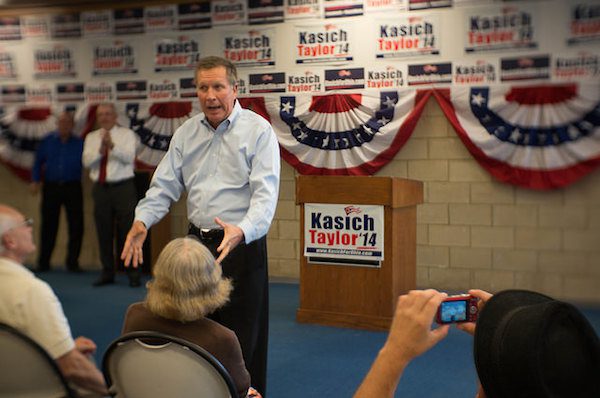Kasich’s Misguided Foreign Policy

Scott McConnell reports on Kasich’s improving position in New Hampshire, and comments on his foreign policy views:
On foreign policy, Kasich seems understated but fairly hawkish: in two events I’ve heard him say Assad is a butcher who must be overthrown, and that he would arm the Ukrainians to resist Putin. I don’t know how fervently he believes this—he certainly isn’t making it a campaign feature. He’s domestically focused.
Based on what I’ve heard him say in the debates, Kasich seems as committed to reckless policies in Syria and Ukraine as any of the other hawkish candidates, but I agree that this isn’t his central message. It’s still useful to review what his foreign policy views are as the New Hampshire primary draws closer. He wants to “punch Russia in the nose,” he has no problem with a reckless “no-fly zone” in Syria, and he insists on meddling in Syria’s civil war. He seems to think regime change is desirable mainly because it will hurt Russia and Iran:
I don’t understand this thing about Assad. He has to go. Assad is aligned with Iran and Russia. The one thing we want to prevent is we want to prevent Iran being able to extend a Shia crescent all across the Middle East. Assad has got to go.
One of the odder things that Kasich said about Syria in the fifth debate was that “the Saudis have agreed to put together a coalition inside of Syria to stabilize that country.” This gives the Saudis too much credit in a couple ways, since it takes for granted that the Saudis want to “stabilize” Syria when their policy for the last four years has been to destabilize. It also credits them with a willingness to take on a bigger role in Syria when they have spent the last year reducing their involvement in the war on ISIS.
Kasich has also made make some very odd and confused statements on foreign policy:
There are moderates in Syria who we should be supporting. I do not support a civil war. I don’t want to be policeman of the world. But we can’t back off of this.
The first and third statements are flatly contradicted by the other two. Kasich says he doesn’t “support a civil war” (an odd way of putting it), but says that the U.S. needs to take sides in a civil war. He claims not to want to police the world, but he thinks it is very important that the U.S. police Syria. He wants to take an interventionist position, but doesn’t want the baggage that goes with it. In that way, he is very similar to Bush and Rubio, who see every crisis and conflict as an occasion for U.S. “leadership” but don’t want to own the costs and risks that go along with it.
Kasich is the only current governor still in the race whose constituents still like him, which puts him in the unique position of being able to draw attention to his record back home without having it blow up in his face. He has been emphasizing both his executive experience in Ohio and the importance of cooperating with the other party, and in contrast to his main rivals Kasich does not usually rely on angry or doom-laden rhetoric. That creates the impression that Kasich is a more responsible and sober politician than his competitors, but as we can see his foreign policy is anything but that.
Comments